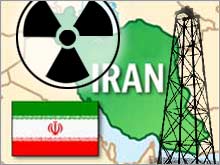|
Will Iran dispute push oil to $130?
While the U.S. imports no Iranian crude, worries about Tehran's nuclear program are boosting prices. It could get a lot worse if the spigot is shut off.
NEW YORK (CNNMoney.com) - Not a drop of oil from Iran reaches the nation's gas pumps. But escalating tensions about Iran's nuclear program are already being felt in oil and gas prices in the United States. That's because even though the United States has banned oil imports from Iran since the 1979 Iranian revolution, some 4 million barrels of Iranian crude are shipped around the world each day, accounting for about 5 percent of global supply. That has an effect on prices everywhere, no matter how much or how little Iranian oil reaches U.S. refineries.
And the growing dispute over Iran's nuclear program is one key reason oil prices have jumped since late December back near $65 a barrel. Some experts say oil would be closer to $60 a barrel absent worries about possible broader sanctions against Iran, and at least one analyst says oil could shoot to more than $130 a barrel, if Iranian oil stopped flowing altogether. Fortunately for world oil markets, most experts see little chance of a complete shutdown of Iranian oil due to the dispute over its nuclear program. "Iran is the only major oil-producing country that still has a budget deficit," said A. F. Alhajji, a professor of economics at Ohio Northern University. "History tells us since the Iranian revolution, they always talk about cutting production, but they've never cut it." Still, uncertainty about Iranian production is what is lifting oil prices today. "If this leads to the shut-off of Iranian oil, I think it would probably mean we've got bigger problems than the price of oil," said Jason Schenker, an economist with Wachovia. "But if we end up with a 1970s-style oil embargo, we could see prices go markedly higher into uncharted territory." The dispute grew further on Saturday when the United Nation's International Atomic Energy Agency passed a resolution to report Iran to the Security Council for possible sanctions, and Iranian President Mahmoud Ahmadinejad announced the government would cease all cooperation with the international nuclear watchdog agency. Tuesday a report out of Iran said the country had demanded the IAEA inspectors remove their surveillance cameras and other equipment from its nuclear sites by mid-February. The estimate for the biggest jump in oil prices if Iran turns off the taps? A doubling to more than $130 a barrel, says Bill Browder, who runs the $4 billion Moscow-based Hermitage fund, which invests in Russian oil companies. Browder cautions that he's not predicting a cut-off of Iranian oil, only suggesting what his historical analysis projects is likely to happen if 5 percent of world oil supplies suddenly disappear from the market. "You have almost no spare capacity in the market. OPEC has only about 1.7 million barrels a day (of excess capacity)," he said. "I think it's highly unlikely they would stop supplying oil. But if the situation escalates, and Israel bombs Iran, it may not be their choice." Ohio Northern's Alhajji said he doesn't think prices would double even with a complete shut-off of Iranian oil. He notes the U.S. strategic petroleum reserve (SPR) already has a supply of oil equal to about 175 days worth of Iranian production, and Europe has its own strategic reserves. "The SPRs are not efficient, but they do work as a cap on prices," he said. "Traders would realize President Bush would release as much oil as he can in that scenario." But even Alhajji says he can't predict what would happen to Iranian oil production or world prices if there is some kind of military action against Iran. In that case, he said, there would be great pressure inside Iran to shut down oil exports, even if the military action is limited to an air strike against Iranian nuclear facilities, leaving its oil infrastructure intact. "There (would) be demonstrations in (Iranian) streets calling for the government to cut off oil exports," Alhajji said. Right now Iranian government and oil officials are vowing to keep oil flowing no matter what action the U.N. takes against the country's nuclear program. "They're saying that right now," Alhajji said. "The sentiment might change with military action." Alhajji also estimates that oil prices could spike $10 a barrel if there is any military action taken against Iran, even if oil facilities are not affected and there are no immediate threats by the country's leaders to cut exports. On the other hand, some kind of resolution of the Iranian nuclear dispute could cause a swift and sharp drop in the price of oil. A number of experts estimate that about 10 percent of current pricing, or about $6.50 a barrel, is due to jitters over Iran. "The saber-rattling on both sides of the table has led to some pricing in of risk, but it's quite conceivable we could see prices go back to $60, even the high $50s, if this dispute reaches a resolution or even a stalemate," said Wachovia's Schenker. For CNN.com's coverage of the vote to have the U.N. security council look at Iran's nuclear program, click here. For a look at what could drive oil as high as $262 a barrel, click here.
2006 oil crunch. Full coverage here. |
|

